Bush’s torture legacy haunts the US
Historian says Obama’s failure to regain moral high ground could impact US troops.
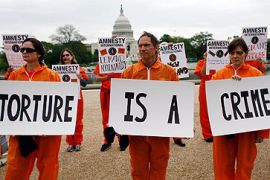
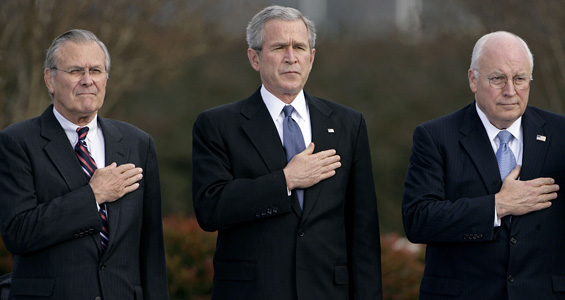 |
| Some human rights groups want Obama to investigate top Bush administration officials [GETTY] |
Somewhere in the borderlands between Afghanistan and Pakistan, Bowe Bergdahl, a US soldier, is being held captive by the Taliban.
The threat of execution hangs over him if the US does not agree to the still unspecified demands of his captors.
Bergdahl is the first US soldier captured in Afghanistan since the 2001 invasion and the circumstances of his capture, which occurred around July 1 outside a US military base in Helmand Province, remain unclear.
But in the wake of years of revelations of abuses by US personnel of Iraqis in Abu Ghraib, and of alleged Taliban or al-Qaeda detainees elsewhere, the spectre of US troops in enemy hands is disturbing because of the possibility that they could face copy-cat treatment.
This is even more troubling when factoring in that US methods involved the use of water-boarding and numerous other “enhanced” interrogation techniques.
So far, it appears that private Berghdal has been unharmed and his Taliban captors have said they would treat him “with dignity.”
It is difficult to determine at this point whether the Taliban position is in response to the shift in rhetoric under the Obama administration or as a propaganda counterpoint to the documented mistreatment of detainees under the previous Bush administration.
The recently issued Taliban “code of conduct” calling for minimising suicide bombings and civilian casualties suggests that it is part of a larger pattern to change the movement’s image both in the region and globally.
However, US military officials have condemned the release of a video depicting Berghdal in captivity as propaganda that is “exploiting the soldier in violation of international law”
“Nation of Laws”
 |
| Bergdahl was captured by the Taliban on July 1 |
Yet even as it condemns such practises, the Obama administration is struggling to come to grips with the many consequences of Bush-era detention and interrogation policies which will continue to impact the experiences of US forces on the ground in Iraq and Afghanistan.
According to major human rights organisations, Obama’s record on this issue remains disappointingly mixed.
On the one hand, Obama’s first actions upon taking office were to announce his intention to close Guantanamo Bay, and end water-boarding and other clearly cruel and degrading forms of interrogation.
These actions were part of a larger attempt to improve the US image in the Muslim world and convince friends and enemies alike that the US is once again a “nation of laws”.
All sides to a conflict are obligated to obey international law, regardless of the conduct of their enemies.
Obama’s actions are partially intended to help ensure that US soldiers who, like private Berghdal, fall into enemy hands are not subjected to the kind of treatment authorised under the Bush administration.
In substantive terms, however, the Obama administration is hewing a path far closer to its predecessor than most Americans realise. This reality could well frustrate Obama’s attempts to cool down anti-American sentiments among potential Taliban and al-Qaeda sympathisers.
It could also further weaken the fabric of the rule of law inside the US itself, enshrining Bush-Cheney-era policies as the political and legal status quo even as the Justice Department and Congress begin investigations into potential criminal conduct at the highest levels of that administration.
Slow progress
Most activists from the human rights community believe Obama walked into an untenable situation when he assumed responsibility for the detention and interrogation policies of the outgoing administration.
His unambiguous declaration that he would close Guantanamo within a year, ensure that the CIA would abide by the Army Field Manual guidelines for interrogating prisoners, and close all secret CIA detention facilities was welcomed around the world.
“The situation certainly improved in terms of the personalities making policy,” explains Gabor Rona, the International Legal Director for Human Rights First.
“There are now people in leadership positions that have a rather different view than their predecessors about both what is lawful and what is good policy.”
Chief among them is Eric Holder, the US attorney general, who has clearly expressed his discomfort at the possibility that those responsible for the torture policies may escape some form of investigation, if not prosecution.
Criticism increases
| In depth | ||||||||||||||||||||||
|
Beyond the level of rhetoric and as yet unfulfilled commitments, however, the Obama administration is facing growing criticism from human rights organisations.
To be sure, the situation Obama has taken ownership of offers few good choices.
According to a senior Amnesty International (AI) analyst, the new administration is being disingenuous when it claims that the situation was worse than they had imagined, and requires a more cautious move than originally intended.
“There was too much information already in the public realm for them to have been surprised,” Tom Parker, the AI’s Policy Director for Terrorism, Counter-terrorism and Human Rights, says
A more plausible reason for the slower pace of change is likely that while newly-appointed high level officials are adopting a different tone, below them the same people are running the show.
“I’m having the same conversations with the same people as under Bush,” a senior activist complained. “They remain as arrogant as ever.”
Indeed, on the ground, interviews with recently released Guantanamo detainees and investigations by organisations such as Human Rights First in Afghanistan are providing evidence that detainee abuse and lack of due process are continuing under the Obama administration, despite the shift in rhetoric.
Trial by hearsay
Parker believes significant attention is being focused on two issues which remain particularly egregious under the new administration: the continuing use of military rather than civilian trials, and the sanctioning of indefinite and potentially permanent imprisonment of detainees.
The latter is being considered even though Jeh C. Johnson, the Pentagon general counsel, recently admitted some detainees had been acquitted by a military commission.
“This is one of the worst things I’ve ever heard a democratic state say,” Parker says.
Shayana Kadidal, the managing attorney for Guantanamo detainee cases at the Centre for Constitutional Rights, confirms that the worst policies of the last two years of the Bush Administration, including military trials and indefinite detentions, “are today being explicitly put forward as viable policies for the future, not just for cleaning up the mess Bush left behind.”
“Why do you need an indefinite detention scheme if you’re going to try people in military commissions? It’s ludicrous and reflects a situation in which the Obama administration has failed politically, while in terms of principle comes off looking unable to make up its mind about what to do.”
Is Obama “waffling”?
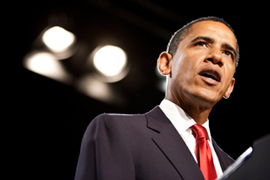 |
| Some analysts believe Obama has been unable to move far from Bush’s policies [EPA] |
The most startling example of this continuity is the administration’s concerted efforts to continue detaining Mohammed Jawad, the youngest Guantanamo detainee, in a case the federal judge presiding says is “riddled with holes.”
The American Civil Liberties Union (ACLU) has criticised this move as reminiscent of the Bush Administration’s constant changes of strategy to frustrate directives from federal judges regarding Guantanamo detainees.
Other examples of such “waffling” is Obama’s objection to Congressional demands that all future interrogations be conducted only by official military personnel rather than contractors, and his willingness to admit hearsay as evidence in military trials.
Admitting hearsay would enable coerced statements to be used against detainees without affording them the opportunity to directly question an interrogator who used the coercive technique.
No new initiatives
Ultimately, in the words of one activist, whatever the good intentions of the Obama administration, the new pragmatic policy-making style remains devoid of new ideas.
“There is very little daylight between Obama and Bush,” Human Rights First’s Gabor Rona says.
Similarly, a senior member of another organisation explains that “renditions to countries that routinely use torture are continuing, as are military trials and indefinite detentions. So much of Obama’s line is that ‘we’ll do it smarter. You can trust us.’ But this is not acceptable.”
Rona, who worked for many years as a lawyer for the International Committee of the Red Cross, says the administration is “still using an overly broad application of the Laws of War paradigm to justify detentions that are not justifiable under international law.”
One reason for the pragmatism thus far is that a pitched battle is underway within the administration over how much of Bush’s policies should be retained.
“The new administration has not spoken with one consistent voice,” Rona says. “There are very strong voices within it that speak in support of the policies and practises of its predecessor.”
Even Obama’s attempt to recalibrate the balance of power between the Executive and Legislative branches back to the pre-Bush era of parity and consultation has failed to produce policy changes.
This is largely because the Democratic-controlled Congress is even more reluctant to take on Republicans on national security issues (and risk being labelled as soft on terrorism) than is the president.
Pursuing senior officials
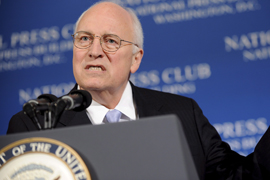 |
| Human rights groups want top officials, like Cheney, to be prosecuted [EPA] |
Kenneth Roth, the executive director of Human Rights Watch (HRW), believes the Obama administration can re-establish rule of law and US moral standing by bringing “those most responsible” for creating and executing illegal policies under the Bush administration to justice.
“Senior officials should be held to the same level of investigation as the soldiers who went to jail for the Abu Ghraib abuses,” he says.
A HRW statement in July urged Holder, the attorney general, to include senior Bush administration officials in his investigation.
“The United States can’t truly claim to have repudiated these egregious human rights violations unless it returns to the day when it treated them as crimes rather than as policy options,” HRW said. The ACLU has supported this position.
Such an investigation would have little to do with political payback.
Most activists agree that if Dick Cheney, the former vice-president, Don Rumsfeld, the former defence secretary and White House lawyers such as John Yoo and Jay Bybee (who developed the legal justifications for Bush officials), are not called to account for their actions while in power, future administrations will feel confident that they can resume now discredited practises without fear of prosecution.
This would make Executive Branch lawyers legal henchman, knowing that even the flimsiest of legal cover for such actions will be enough to protect from future prosecution.
The Centre for Constitutional Rights’ Kadidal argues that any investigation by the Justice Department or Congress “needs to go to the top”.
“This wasn’t a situation where people started doing things in the field under pressure and Washington just tried to give them legal cover afterwards. In fact, it’s just the opposite. It was top down; the directions came from Washington and were clearly signed off by Rumsfeld and Cheney,” she said.
Bush administration authorisation
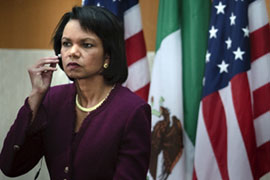 |
| Declassified reports indicate Rice authorised harsh interrogation methods [GETTY] |
According to a declassified Senate Intelligence Report released in April, Condoleezza Rice, national security adviser, John Ashcroft, the attorney general, and George Tenet, the CIA director and their legal councils all joined Cheney in authorising waterboarding and other harsh interrogation methods in 2002.
What is still unknown but could be determined by a Justice Department or Congressional investigation is whether Bush was one of “the principals” who according to the report, “reaffirmed that the CIA [enhanced interrogation] program was lawful and reflected administration policy.”
But such an investigation will extract a high political price at a time when most Americans are not focused on these issues and not pressing the White House or Congress to act on them.
In the absence of such sustained public pressure, many human rights professionals believe that the failure of Bill Clinton, the former US president, to reform the military’s ban on gays serving openly still stands as a warning not to waste precious political capital on divisive issues that don’t have wide public support.
As AI’s Parker says: “What we haven’t been able to do is put millions in the streets [on this issue]. Amnesty can’t get a meaningful turnout, and if we can’t, no one can.”
Instead, the human rights community is focusing much of its energy on the mainstream media. But while most journalists and editors are sympathetic to a human rights agenda, they simply do not have the time or space to focus regularly on these issues.
A significant share of the Washington commentating class has accepted the administration’s arguments that pragmatism rather than pushing for human rights and democracy is the best rudder for US foreign policy.
Impetus For Obama
Is there a chance that Obama will take the lead on this issue? Roth is sure Obama at least knows the stakes.
“I met with Obama a few months ago. He fully understands the importance of maintaining the moral high ground to fight terror because without it the international co-operation needed to fight it is discouraged.”
While most Americans support human rights in principle, a majority still believe, erroneously, that torture works. As Kadidal points out, this makes it very hard to construct a powerful public narrative to motivate Americans en masse to push for real change.
“Most of the public do not know that torture and coercive interrogations don’t work. Regular polling conducted by the Open Society Institute reveals that the public still believes it can produce good intelligence. And with people worried today about losing jobs, global warming, and so on – there’s even less room to convince them otherwise.”
HRW’s Roth says such a situation makes it difficult to know whether Obama has the strength and political space to “abide with the insight he himself has, and share with the American people his understanding that human rights is not only the right thing to do but it’s also the smart thing to do.”
“Our golden rule is, ‘don’t do anything to detainees that you wouldn’t want done to one of your own captured soldiers’,” he says.
As the United States ramps up its military engagement in Afghanistan and Pakistan, the Obama administration and its military leadership would be wise to heed this advice.
Mark Levine is a professor of history at the University of California, Irvine and author, most recently, of Heavy Metal Islam: Rock, Resistance, and the Struggle for the Soul of Islam (Random House 2008) and Impossible Peace: Israel/Palestine Since 1989 (Zed Books, 2009).
The views expressed in this article are the author’s own and do not necessarily reflect Al Jazeera’s editorial policy.
